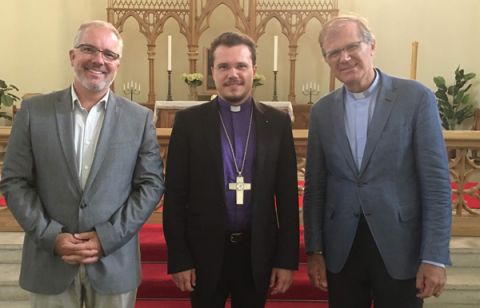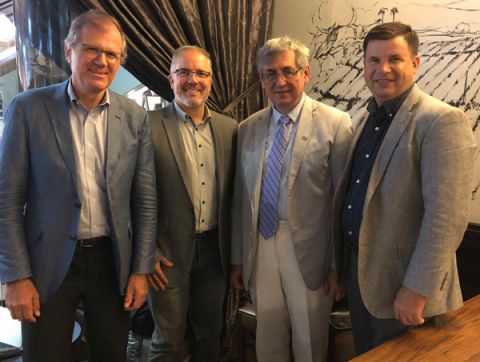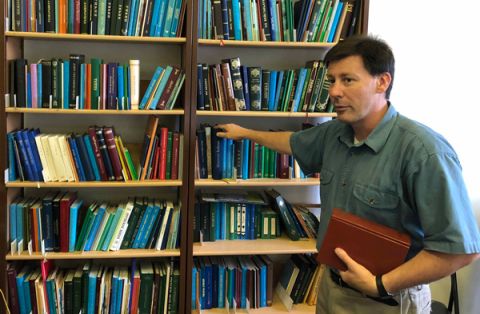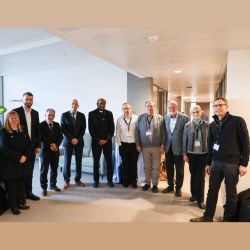 Olivier Fleury,Dietrich Brauer,Martin Hoegger
Olivier Fleury,Dietrich Brauer,Martin Hoegger
“It's our responsibility to keep them remembered, but research is difficult. Some archives are still secret”, he says.
The presentation of the project JC2033 first evokes in him the Jubilee of the Reformation, which took place last year, with an inter-Protestant action, together with the Catholic Church.Brauer is a member of an Advisory Council between the Orthodox, Catholic and Evangelical Fellowship Churches. “It is within this framework that we can think of what is possible for the Jubilee of 2033. Today the churches are learning that they must open up more to each other in order to be heard”.
He adds that the Lutheran Church can be a bridge between the various churches because it has the confidence of all. To speak about this Jubilee practically is too early, but it is good to start thinking about it. Such an approach also needs international support.
The main point of our faith
In a “Starbucks” we have breakfast with Alexander Fedichkin, a pastor of the Baptist Church, president of the Russian Evangelical Alliance, and Vitaly Voronov, a member of his committee. The first is also president of the Council of Evangelical Churches and the second is also responsible for the search for funds in the European Evangelical Alliance.
 Olivier Fleury, Alexandre Fedichkin, Vitaly Voronov, Martin Hoegger
Olivier Fleury, Alexandre Fedichkin, Vitaly Voronov, Martin Hoegger
“We agree with your five DNA’s (https://www.jc2033.world/en/info/adn.html) which are excellent. Many Russians believe in God but do not understand the reason of the resurrection. We need to give them the meaning: how it opens them to a new life”, says A. Fedichkin.
Vitaly Voronov is enthusiastic: “If Jesus is alive, life is here. JC2033 is a beautiful idea. Without resurrection our faith is futile, as the Apostle Paul says. It is the main point of our faith. I hope that all churches can be together on this occasion. "
But he notes that in Russia state rules are binding. To do something at the national level requires the agreement of the government. So the advice of the Advisory Council of Churches will be decisive.
“But where does this brilliant idea come from, which seems so obvious to me”, exclaims the pastor of St. Andrew's Anglican Church, Malcolm Rogers. The name of his website speaks for itself and shows his conviction about the resurrection: Cross and Resurrection! (http://crossandresurrection.blogspot.com)
What he understood about Russia is that you can not predict what will happen next week. Forget about 15 years! But it is worth starting today: “When there is a vision, my role is to support it. Pastors should not control, but stimulate. As a parish pastor I am looking for material that is relevant to my context. The most important thing is to live the death and resurrection of Christ every day”.
Transmitting the Word of God
Anatoly Rudenko, director of the Bible Society in Russia has the same thought: “Fifteen years is far!” “The mission of the Bible Society (http://www.biblia.ru/en/?lang=e) will be the same in 2033 as today: to make known the Word of God in a language that people can understand. Also promote its reading, while Russians read less and less! This is the most important point of the current ministry, and probably in fifteen years.”
The monastery of St. Andrew is nestled in an arm of the Moskva, surrounded by a park. On the second floor we enter the Institute for Bible Translation (https://ibtrussia.org/en/). Established in 1971 by Protestants in Scandinavia, it was registered in Russia in 1990 and its work became interdenominational.
Its director Vitaly Voinov explains that his goal is to translate the Scriptures in the many non-Slavic languages of Russia. Of the 130 languages, 40 translations are in progress and parts of the Bible have been translated into more than 80 languages.
 Vitaly Voinov
Vitaly Voinov
“Our two biggest challenges today are first to have workers in the harvest, then to juggle between Orthodox, Protestants and the academic world”, he says.
Alexey and Natalya Gorbunova, the deputy directors give us a book published on the occasion of the two thousand years of the birth of Christ: the story of the nativity in 80 languages spoken in Russia and the Commonwealth of Independent States. A similar project could be completed in 2033.
To conclude, we also met two young people who, without doubt, summarize the attitude of many young Christians: Alexander Semkin, the director of IFES (International Fellowship of Evangelical Students): “I like the common focus on the resurrection of Jesus. It's the strength of your movement”. And Anya Priemysheva, collaborator at the Civic Chamber of the Russian Federation, an advisory body of non-governmental organizations: “In Russia, people do not know what Easter is, they often confuse this holiday with Christmas. Evangelization is necessary”.
Martin Hoegger


